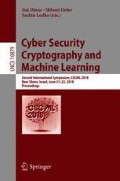Abstract
To quantify the amount of high-level context information which can be derived by observing only a user’s touchscreen interactions, we performed a user study, in which we recorded 160 touch interaction sessions from users running different applications, and then applied both classical machine learning methods and deep learning methods to the results. Our results show that it is possible to derive higher-level user context information based on touch events alone, validating the efficacy of touch injection attacks.
This research was supported by Israel Science Foundation grants 702/16 and 703/16.
Access this chapter
Tax calculation will be finalised at checkout
Purchases are for personal use only
References
Motorola Mobility. Cracked screens and broken hearts - the 2015 motorola global shattered screen survey. https://community.motorola.com/blog/cracked-screens-and-broken-hearts
Shwartz, O., Shitrit, G., Shabtai, A., Oren, Y.: From smashed screens to smashed stacks: attacking mobile phones using malicious aftermarket parts. In: 2017 IEEE European Symposium on Security and Privacy Workshops, EuroS&P Workshops 2017, Paris, France, 26–28 April 2017, pp. 94–98. IEEE (2017)
Shwartz, O., Cohen, A., Shabtai, A., Oren, Y.: Shattered trust: when replacement smartphone components attack. In: Enck, W., Mulliner, C. (eds.) 11th USENIX Workshop on Offensive Technologies, WOOT 2017, Vancouver, BC, Canada, 14–15 August 2017. USENIX Association (2017)
Frank, M., Biedert, R., Ma, E., Martinovic, I., Song, D.: Touchalytics: on the applicability of touchscreen input as a behavioral biometric for continuous authentication. IEEE Trans. Inf. Forensics Secur. 8(1), 136–148 (2013)
Meng, Y., Wong, D.S., Schlegel, R., Kwok, L.: Touch gestures based biometric authentication scheme for touchscreen mobile phones. In: Kutyłowski, M., Yung, M. (eds.) Inscrypt 2012. LNCS, vol. 7763, pp. 331–350. Springer, Heidelberg (2013). https://doi.org/10.1007/978-3-642-38519-3_21
Author information
Authors and Affiliations
Corresponding author
Editor information
Editors and Affiliations
Rights and permissions
Copyright information
© 2018 Springer International Publishing AG, part of Springer Nature
About this paper
Cite this paper
Azran, M., Shabat, N.B., Shkolnik, T., Oren, Y. (2018). Brief Announcement: Deriving Context for Touch Events. In: Dinur, I., Dolev, S., Lodha, S. (eds) Cyber Security Cryptography and Machine Learning. CSCML 2018. Lecture Notes in Computer Science(), vol 10879. Springer, Cham. https://doi.org/10.1007/978-3-319-94147-9_23
Download citation
DOI: https://doi.org/10.1007/978-3-319-94147-9_23
Published:
Publisher Name: Springer, Cham
Print ISBN: 978-3-319-94146-2
Online ISBN: 978-3-319-94147-9
eBook Packages: Computer ScienceComputer Science (R0)

